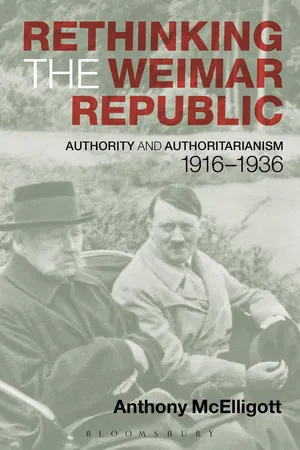
Rethinking the Weimar Republic
Authority and Authoritarianism, 1916-1936
- 384 pages
- English
- PDF
- Available on iOS & Android
About this book
"McElligott's impressive mastery of an enormous body of research guides him on a distinctive path through the dense thickets of Weimar historiography to a provocative new interpretation of the nature of authority in Germany's first democracy." Sir Ian Kershaw, Emeritus Professor of Modern History at the University of Sheffield, UK This study challenges conventional approaches to the history of the Weimar Republic by stretching its chronological-political parameters from 1916 to 1936, arguing that neither 1918 nor 1933 constituted distinctive breaks in early 20th-century German history. This book: - Covers all of the key debates such as inheritance of the past, the nature of authority and culture
- Rethinks topics of traditional concern such as the economy, Article 48, the Nazi vote and political violence
- Discusses hitherto neglected areas, such as provincial life and politics, the role of law and Republican cultural politics
Frequently asked questions
- Essential is ideal for learners and professionals who enjoy exploring a wide range of subjects. Access the Essential Library with 800,000+ trusted titles and best-sellers across business, personal growth, and the humanities. Includes unlimited reading time and Standard Read Aloud voice.
- Complete: Perfect for advanced learners and researchers needing full, unrestricted access. Unlock 1.4M+ books across hundreds of subjects, including academic and specialized titles. The Complete Plan also includes advanced features like Premium Read Aloud and Research Assistant.
Please note we cannot support devices running on iOS 13 and Android 7 or earlier. Learn more about using the app.
Information
Table of contents
- Title Page
- Copyright Page
- Contents
- List of Tables
- List of Maps
- Acknowledgements
- Chapter 1 Introduction: A Republic without Authority?
- Chapter 2 1916/19: The Antinomies of Authority
- Chapter 3 Authority Revitalized: Weimar’s Foreign Policy
- Chapter 4 The Authority of Money
- Chapter 5 The Authority of Law: The Judiciary
- Chapter 6 The Quest for Cultural Authority
- Chapter 7 Renegade Authority: The Junker Landrat
- Chapter 8 Authority Between Democracy and Dictatorship
- Chapter 9 Authority Unbound 1933–36
- Notes
- Selected Bibliography
- Index